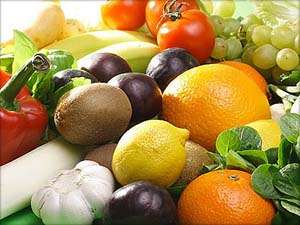Vitamins Nutrition
Vitamins are organic food substances found only in living things, i.e. plants and animals. They are essential for our bodies to function properly, for growth, energy and for our general well-being. With very few exceptions the human body cannot manufacture or synthesize vitamins. They must be supplied in our diet or in man-made dietary supplements. Some people believe that vitamins can replace food, but that is incorrect. In fact, vitamins cannot be assimilated without also ingesting food. That is why it is best to take them with a meal. Synthetic vitamin supplements can be of varying quality, so it is a good idea to get your supplements from a reliable source.

Before taking any dietary supplements, though, take a long look at your diet. Maybe you can improve it!
What changes can you make to it to make sure that you are getting enough of the nutrients you need to live a healthy life? If you’re not eating enough fruits and vegetables, you definitely need to change your eating habits to change your nutritional intake.
Even the healthiest eaters among us, though, slip up from time to time. There may be certain vitamins or minerals that we’re not getting enough of in our diets. Your best bet then is to determine what nutrients you are lacking and then find healthy nutritional supplements that will provide them instead
It’s important, of course, to get your vitamins nutrition supplements – whatever they may be – from a reputable source.
mutlivitaminsThe best place is usually your local pharmacist or drugstore. Alternatively go online as you will find that internet stores will often have a wider choice of nutritional vitamins and cheaper prices too. It’s not really wise to purchase supplements that you see advertised on late-night infomercials or in the back pages of magazines.
Secondly, you should consult with your local pharmacist whenever you do purchase dietary supplements. A pharmacist can tell you exactly how to properly take a particular vitamin supplement and whether there are any safety guidelines to be aware of before taking it.
Next, make sure you don’t purchase too many dietary supplements. Again, remember that you should be getting most of your nutritional vitamins directly from the foods that you eat.
If you find yourself purchasing too many different supplements, it’s a sign that you are not eating a healthy or balanced diet.
Multi Colored Peppers (Background)Many of us prefer to buy supplements that contain only organic ingredients. This makes sense: When you buy organic, you are getting the healthiest and safest ingredients possible.
Check the label, too, before buying any dietary or vitamin supplement. Look for something that indicates that the supplement was tested to guarantee that it contains the amount of nutrients that it claims.
Kale, broccoli, spinach, carrots, squash, sweet potatoes, liver, eggs, whole milk, cream, and cheese.
Vitamin Actions Sources
A
* Needed for vision
* Helps your body fight infections
* Helps keep your skin healthy
Kale, broccoli, spinach, carrots, squash, sweet potatoes, liver, eggs, whole milk, cream, and cheese.
B1
* Helps your body use carbohydrates for energy
* Good for your nervous system
Yeasts, ham and other types of pork, liver, peanuts, whole-grain and fortified cereals and breads, and milk.
B2
* Helps your body use proteins, carbohydrates, and fats
* Helps keep your skin healthy
Liver, eggs, cheese, milk, leafy green vegetables, peas, navy beans, lima beans, and whole-grain breads.
B3
* Helps your body use proteins, carbohydrates, and fats
* Good for your nervous system and skin
Liver, yeast, bran, peanuts, lean red meats, fish, and poultry.
B5
* Helps your body use carbohydrates and fats
* Helps your body make red blood cells
Beef, chicken, lobster, milk, eggs, peanuts, peas, beans, lentils, broccoli, yeast, and whole grains.
B6
* Helps your body use proteins and fats
* Good for your nervous system
* Helps your blood carry oxygen
Liver, whole grains, egg yolk, peanuts, bananas, carrots, and yeast.
B9 (folic acid or folate)
* Helps your body make and maintain new cells
* Prevents some birth defects
Green leafy vegetables, liver, yeast, beans, peas, oranges, and fortified cereals and grain products.
B12
* Helps your body make red blood cells
* Good for your nervous system
Milk, eggs, liver, poultry, clams, sardines, flounder, herring, eggs, blue cheese, cereals, nutritional yeast, and foods fortified with vitamin B12, including cereals, soy-based beverages, and veggie burgers.
C
* Needed for healthy bones, blood vessels, and skin
Broccoli, green and red peppers, spinach, brussels sprouts, oranges, grapefruits, tomatoes, potatoes, papayas, strawberries, and cabbage.
D
* Needed for healthy bones
Fish liver oil, milk and cereals fortified with vitamin D. Your body may make enough vitamin D if you are exposed to sunlight for about 5 to 30 minutes at least twice a week.
E
* Helps prevent cell damage
* Helps blood flow
* Helps repair body tissues
Wheat germ oil, fortified cereals, egg yolk, beef liver, fish, milk, vegetable oils, nuts, fruits, peas, beans, broccoli, and spinach.
H (biotin)
* Helps your body use carbohydrates and fats
* Needed for growth of many cells
Liver, egg yolk, soy flour, cereals, yeast, peas, beans, nuts, tomatoes, nuts, green leafy vegetables, and milk.
K
* Helps in blood clotting
* Helps form bones
Alfalfa, spinach, cabbage, cheese, spinach, broccoli, brussels sprouts, kale, cabbage, tomatoes, plant oils. Your body usually makes all the vitamin K you need.
